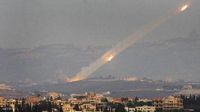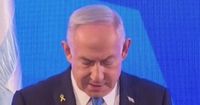As tensions rise at the Israeli-Lebanese border, residents of the Metulla settlement are beginning to evacuate following renewed rocket fire from Lebanon for the first time in four months. On Saturday morning, March 22, 2025, the Israeli army intercepted three rockets launched toward the northern settlement of Metulla, prompting residents to take precautions for their safety.
David Azulai, the head of the Metulla settlement, reported that the tumultuous situation has led many of the residents to pack their belongings and prepare to leave. In comments to the press, he noted, "8 percent only of the residents have returned (to Metulla since the ceasefire in November last year)." He further elaborated on the urgency of the situation, stating that the evacuation is due to a "real security threat" that has emerged following the rocket fire. Azulai expressed concern that under the current conditions, it is unlikely that residents will return anytime soon.
Azulai, representing the sentiments of the settlement’s residents, emphasized, "We will not keep the residents of Metulla as hostages to a security settlement." The Hebrew Broadcasting Corporation reported that there was a collective sense of danger, with Azulai warning that efforts to return residents to the settlement without ensuring their safety was both dangerous and irresponsible. This statement underlines the precarious situation faced by the community in Metulla, where only a fraction of the population feels secure enough to remain.
The urgency of the situation is further underscored by the context of wider regional tensions. The recent rocket fire serves as a troubling reminder of the volatility at the border. Residents and officials alike are drawing attention to the perceived failure to adequately address security concerns. As Azulai pointed out, he referred to the recent attacks as a reminder for those who believe that it is safe to return: "The launching of rockets from Lebanon is a reminder to those who claim there is no security obstacle to returning to the town." This resonates with the broader security narrative that has concerned both Israeli officials and local residents.
In light of these developments, Israeli forces have commenced retaliatory strikes against several towns and villages in southern Lebanon, leading to casualties among local populations, according to local media reports. This escalation raises questions about the ongoing cycle of violence and the prospects of peace in the region.
Meanwhile, on another front, Israeli opposition leader Yair Lapid voiced his concerns about the current government’s handling of tensions within Israel. Speaking during a protest in Tel Aviv, Lapid accused Prime Minister Benjamin Netanyahu of inciting a civil war. He stated, "The government is doing everything to start a civil war, and Benjamin Netanyahu is pushing for that publicly." This highlights the internal strife within Israel amidst external military pressures.
Further complicating the situation, the governments of Egypt, Qatar, and the United States announced they had brokered a ceasefire agreement between Israel and Hamas in Gaza. This agreement includes provisions for the withdrawal of Israeli forces from populated areas, a prisoners exchange program, and the return of displaced residents to their homes within the Gaza Strip. Lapid’s objections suggest not only a division in political opinion but also the challenge of achieving peace amidst rising domestic tensions.
As this multifaceted crisis unfolds, it is clear that the affected communities—whether in Metulla, Gaza, or surrounding areas—are grappling with a fragile sense of security. The narrative of violence is intertwined with a pressing political discourse in Israel, underscoring the complexities of seeking stability in an environment marked by conflict.
The response from Israeli defense forces underscores a broader strategy of maintaining security while managing external confrontations. However, as seen through Azulai's commentary, the stakes remain high for the residents of the settlements bordering Lebanon.
Ultimately, as the dust settles from the renewed hostilities, the emphasis remains on fragile safety and the urgent need for effective conflict management strategies to prevent further escalation. The experiences of Metulla's residents are emblematic of the broader struggles faced across the region.
With tensions flaring and political divisions deepening, the journey towards resolution appears daunting. As leaders from various factions navigate the complex landscape of military engagements, the hope for lasting peace remains an elusive target.


